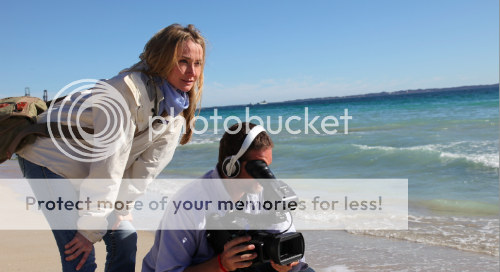 Willowy, soft-spoken but self-confident, Alexandra Cousteau, with her long straight hair, is a lot like Calista Flockhart’s character, Ally McBeal. She has an integrity about life and expresses a calling to do what is right. She views the water she grew up experiencing as a sacred source of life and she is making movies, like her grandfather, Jacques-Yves Cousteau, about both water’s beauty and endangerment.
Willowy, soft-spoken but self-confident, Alexandra Cousteau, with her long straight hair, is a lot like Calista Flockhart’s character, Ally McBeal. She has an integrity about life and expresses a calling to do what is right. She views the water she grew up experiencing as a sacred source of life and she is making movies, like her grandfather, Jacques-Yves Cousteau, about both water’s beauty and endangerment.
The Willamette Riverkeeper, a nonprofit Oregon organization dedicated to the protection and restoration of the Willamette River, sponsored Cousteau’s visit July 21, 2010, at Portland’s famous Bagdad Theatre. To honor Cousteau and her crew, The Last Regiment of Syncopated Drummers, a 35-member exciting biker-like drum band, opened the evening marching down pitch-black aisles with red-lit drums walloping out energy.
Then Cousteau came out and introduced her beautiful mother who was seated across the aisle from those of us representing a local peace and justice group. Alexandra didn’t mention it, but her father, Philippe, Jacques-Yves Cousteau’s son and partner, died in a plane crash when she was just 3 years old. Therefore, the father figure she learned from was her famous grandfather.
She remembers her grandfather playing mermaid games with her and teaching her how to scuba dive when she was seven years old. Cousteau would answer all her questions about the sea until he grew weary and then, with a twinkle in his eye, tell her she’d just have to go see for herself. In this way, Alexandra grew up with a personal experience and love relationship with sea.
Last year Alexandra traveled for 100 days to five continents under the sponsorship of The National Geographic to study communities and their relationships to water. She showed the Bagdad audience two clips of the film she made from this journey entitled “Expedition: Blue Planet.”
The trailer below provides a good summary of this beautiful film.
Alexandra Cousteau – Expedition Blue Planet 2009 Promo from Michael Duff on Vimeo.
Alexandra has many concerns that she talks about in the 2009 film. First of all, she told the audience that the Himalayan glaciers are melting right now faster than anywhere else in the world. The water made from these glaciers affects a tremendous part of the pan-Asian population. She remarks, “We are connected by water because we are all downstream from one another.”
One of the clips, made available online, relates to the politics of water. As water becomes more scarce, how will people allocate it? What is occurring between Israel and her neighbors being that their underground water sources do not recognize political boundaries?
Alexandra Cousteau – Expedition Blue Planet 2009 – Peace from Michael Duff on Vimeo.
As part of this film Alexandra and her crew visited the Gulf of Mexico off the shores of Louisiana last summer. She told the audience how the agricultural run-off from the Midwest is contaminating the Mississippi with fertilizers and pesticides. At the place where the river empties into the Gulf of Mexico a Dead Zone has formed. This area of water, extending east along the coastal area to Texas, can no longer sustain life.
Just a couple weeks ago she returned to the same area and thought to herself that last year she was thinking the pollution of the Mississippi River was the worst thing that could happen to the region. Now she was seeing first-hand the oil damage looming on the horizon after the BP oil calamity.
This year, Alexandra, 34, is on a 138-day journey to investigate water issues in America. She was just in from spending 20 days on the Colorado River. One of the purposes of this new film project is to investigate how some communities are trying to save their water resources.
Alexandra’s speaking partner and executive producer, Jonathon Smith, said that the film they are working on is going to focus on three things: water quantity, water quality and understanding the watershed. They hope this film, “Blue Legacy” — sponsored by The National Geographic — will help people understand our water system better and influence educational funding campaigns related to energy use.
Cousteau won recognition in the 2009 Jackson Hole Wildlife Film Festival last October for an outstanding Web site. It is there that she notes in her current expedition diary that Portland, Oregon, is the second greenest city in the world after Reykjavik, Iceland. In a place where there are over 6,000 lakes, ponds, marshes and reservoirs, Oregon ranks a healthy seventh in irrigation water withdrawals.
To follow Cousteau’s trip go to her Web site, www.alexandracousteau.org, and respond to her invitation to join in the conversation about our interconnectivity to water.

. . .
Follow It’s Just Movies on Twitter at http://twitter.com/ItsJustMovies.
I went to see Cousteau at The Bagdad too! That drum group was amazing. I wish Cousteau would have talked a little about the Columbia River.
It is amazing to think that we could build world peace by learning how we HAVE to cooperate on water use issues. It seems peace is often a result of working together on common problems. Kudos for the film!